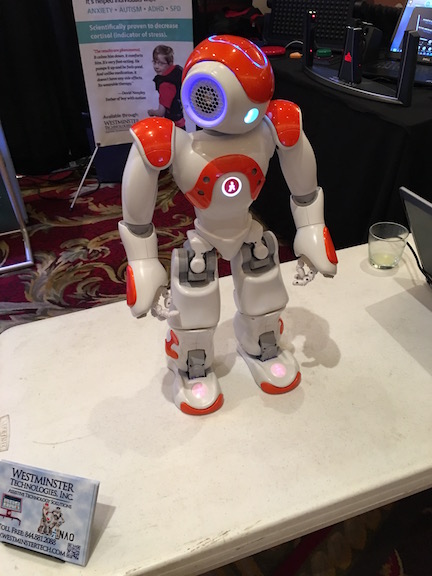 Robots will play an increasingly important role in home healthcare in the years ahead. The little guy in the picture was developed by Westminster Technologies, Inc. in Cleveland, OH. The target market for the robots is K-12 schools. Some STEM programs (science technology engineering mathematics) have funding for the technology. Kids can learn how they work and develop programs the robot can execute. A simple example, would be a program that reads a text file. This may have applicability in home healthcare. A robot could remind a chronically ill patient when it is time to take a medication. For mentally ill patients, the robot could become a companion.
Robots will play an increasingly important role in home healthcare in the years ahead. The little guy in the picture was developed by Westminster Technologies, Inc. in Cleveland, OH. The target market for the robots is K-12 schools. Some STEM programs (science technology engineering mathematics) have funding for the technology. Kids can learn how they work and develop programs the robot can execute. A simple example, would be a program that reads a text file. This may have applicability in home healthcare. A robot could remind a chronically ill patient when it is time to take a medication. For mentally ill patients, the robot could become a companion.
In theory, robots could take on a much greater role in home healthcare. They also could also help people recovering from a stroke to re-learn how to perform basic functions. Therapists and aides can perform the task, but such therapy can be expensive and not pleasant to administer. Robots, on the other hand can work around the clock, and they never get bored with repetitive tasks. The question about robots is whether people will accept them and not be intimidated by them. A reason to be hopeful is that while the technology is gaining more and more capabilities, it is also becoming more human-like. Health attitudes will adapt and robots will become allies in our healthcare.
Researchers at the Personal Robots Group at MIT’s Media Lab have developed a robot with a baby face with a round head, small chin, and wide eyes that appears more capable of feeling than robots of other designs.[i] The MIT Group found people prefer baby-faced robots for medical advice and for tasks that depend on emotion such as from a therapist. The research also showed child-faced robots are less likely to threaten the autonomy of elderly individuals. The Robot Group at MIT has built a robot named Nexi that exhibits many of the characteristics which may be critical to the long-term future of robots in healthcare.
Dr. Adam Waytz, Assistant Professor at Northwestern University’s Kellogg School of Management, and Dr. Michael Norton, Professor at Harvard Business School have developed a list of five human-like characteristics they believe will be most important in the acceptance of robots. Faces and voices may be the most obvious. The ability to express empathy is a close third. More surprising but important characteristics Waytz and Norton believe will be important are the ability to provide mimicry and unpredictability. The latter two characteristics pique the interest of humans and result in more acceptance and trust. The reason is these two characteristics are more like humans. Click here to watch the Westminster Robot dance. Read much more about robots in healthcare in Health Attitude.
[mc4wp_form id=”27434″]
